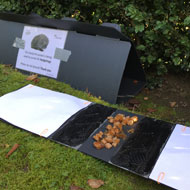Project to explore climate’s impact on hedgehogs

The inside of a footprint tracking tunnel, being used to monitor hedgehog activity.
Leicester researchers are set to explore how the changing climate is affecting British hedgehog survival during winter waking.
Led by Saadia Khan at the University of Leicester, the project will investigate whether warmer wetter winters are impacting invertebrate food sources for hedgehogs, which would have a detrimental impact on their ability to survive.
Hedgehogs wake up periodically during hibernation to forage for food in warm winter spells. Khan said: “With warmer winters, these periods of winter waking may be increasing. This poses problems if the energy lost during winter waking is not replaced due to the lack of food sources available in the winter.”
University of Leicester research on hedgehog activity is already underway at 12 sites and has previously looked at food availability and hedgehog activity in autumn.
Khan, who is being supervised by Dr Moya Burns from the university’s geography department, will build on this research by using footprint tracking tunnels to monitor hedgehog activity and putting out data loggers to explore whether there is a link between how often hedgehogs forage over winter, and ambient temperature. Food availability will be assessed by sampling for ground beetles, earthworms and slugs.
A previous study by Leicester City Council found several population clusters around Leicester and has helped to inform some of the sites in the current project.
Richard Kelly, natural conservation officer at the city council said: “It is hoped that the findings may indicate where extra conservation efforts could be focused in helping to reduce the decline of the hedgehog.”



 The veterinary mental health charity Vetlife is inviting the veterinary community to join it for a sponsored cold-water dip.
The veterinary mental health charity Vetlife is inviting the veterinary community to join it for a sponsored cold-water dip.